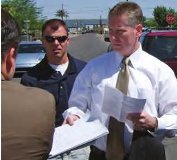2/24/2009
Arizona: County Prosecutor Dismisses Criminal Speed Camera CitationsTop prosecutor in Maricopa County, Arizona will dismiss criminal photo radar citations on legal and constitutional grounds.

Motorists will no longer be sent to jail on the mere accusation of a machine in Maricopa County, Arizona. County Attorney Andrew Thomas yesterday announced that he will dismiss all criminal speeding and reckless driving cases brought to him when the only evidence presented is a photo radar ticket. Thomas condemned the process that imposes jail time on those accused of driving 20 MPH over the speed limit without any human witness to the alleged crime.
"The bottom line is, the way the law is written and the way our Constitution is written, to bring criminal prosecutions based on photo radar evidence only is not something our office can do, or frankly should do, given the Constitutional mandates," Thomas said.
In 2008 the legislature specifically eliminated license points from tickets issued under the statewide freeway ticketing program (view law). Lawmakers understood that motorists would be more likely to pay tickets without challenge if the only penalty was a $181 monetary fine that did not boost insurance rates or threaten a license suspension. This revised legislative language prohibits criminal prosecution.
"Notwithstanding any other law, if a person is found responsible for a civil traffic violation or a notice of violation pursuant to a citation issued pursuant to this section, the department of transportation shall not consider the violation for the purpose of determining whether the person's driver license should be suspended or revoked," Arizona Code Section 41-1722 states. "A court shall not transmit abstracts of records of these violations to the department of transportation."
Under state law, criminal speeding is a class three misdemeanor that carries license points and the possibility of license suspension, plus thirty days in jail and a $500 fine. Thomas' decision is a slap in the face to the state Department of Public Safety (DPS) which has used high-profile photo ticket arrests as a public relations tool. In August, for example, a young motorist was led in handcuffs out of the Sky Harbor International Airport with a DPS camera recording the event for distribution to local media. Last week, DPS issued another press release citing similar arrests as a justification for the automated ticketing program.
"Ongoing apprehensions of major violators are further evidence enforcement works," the press release stated. "DPS recently arrested three suspects for reckless driving and criminal speeding. Video and photos of the suspects are available on request."
Thomas says he became personally involved after looking more closely at what the state police was asking him to do.
"DPS keeps pressing us on this," Thomas said. "The cases we are receiving underscore why we have these constitutional rules. Some of the cases that were brought to my attention -- there was one case in which the defendant was male but the driver in the photo appeared to be female. In another one the age didn't match, and a much older woman, someone in her seventies, was the defendant but it appeared that someone else was driving the vehicle."
Thomas said the proper way to prosecute the crime is to have a live police officer witness the offense, identify the individual responsible and testify to these facts in court.
"You have to have a witness," Thomas said. "It isn't something you can just ignore.... The U.S. Supreme Court has upheld a broad interpretation of the rights of defendants under the Confrontation Clause... Arizona courts have interpreted this clause as giving defendants the right to question and cross-examine witnesses. There is no opportunity to question or cross-examine a camera."
Thomas did not offer an opinion on the legality of the civil photo radar citations because his office does not handle them. In January, Maricopa County Justice Court Judge John C. Keegan declared the civil speed camera tickets unconstitutional (view decision). The Maricopa County Attorney's Office is one of fourteen in the state, although many of the other jurisdictions look to Maricopa County for guidance.


